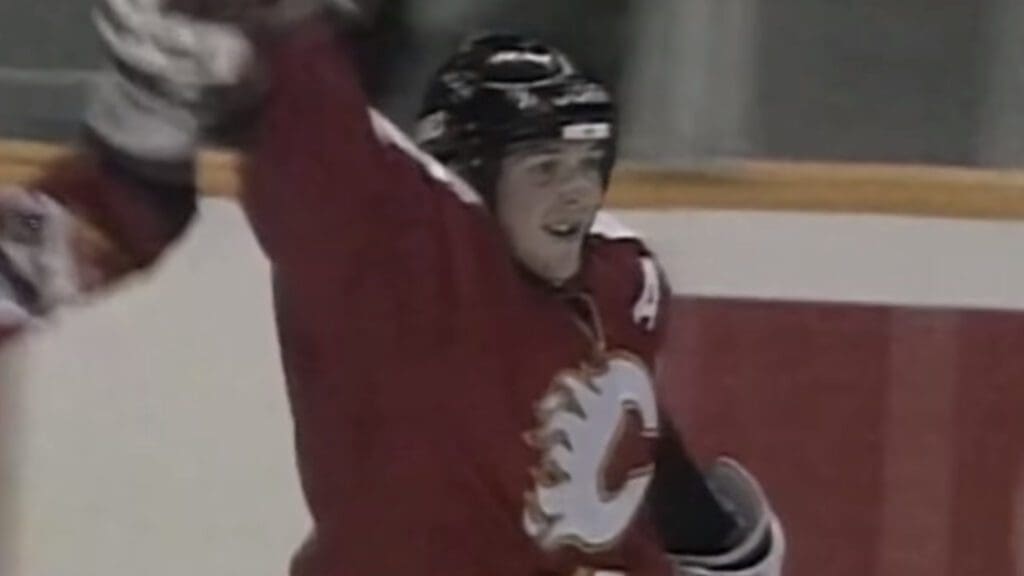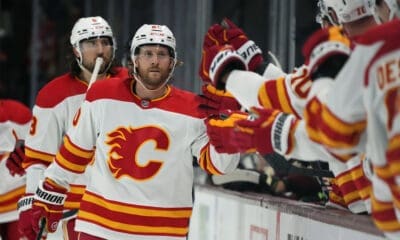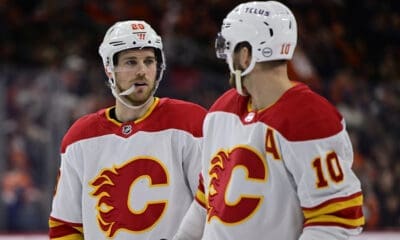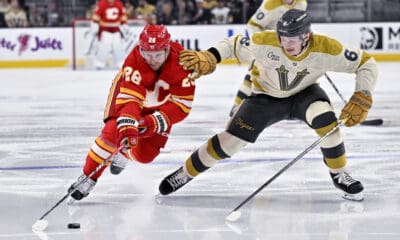Calgary Flames
Top all-time Flames draft picks: Rounds 7-9 buried gems
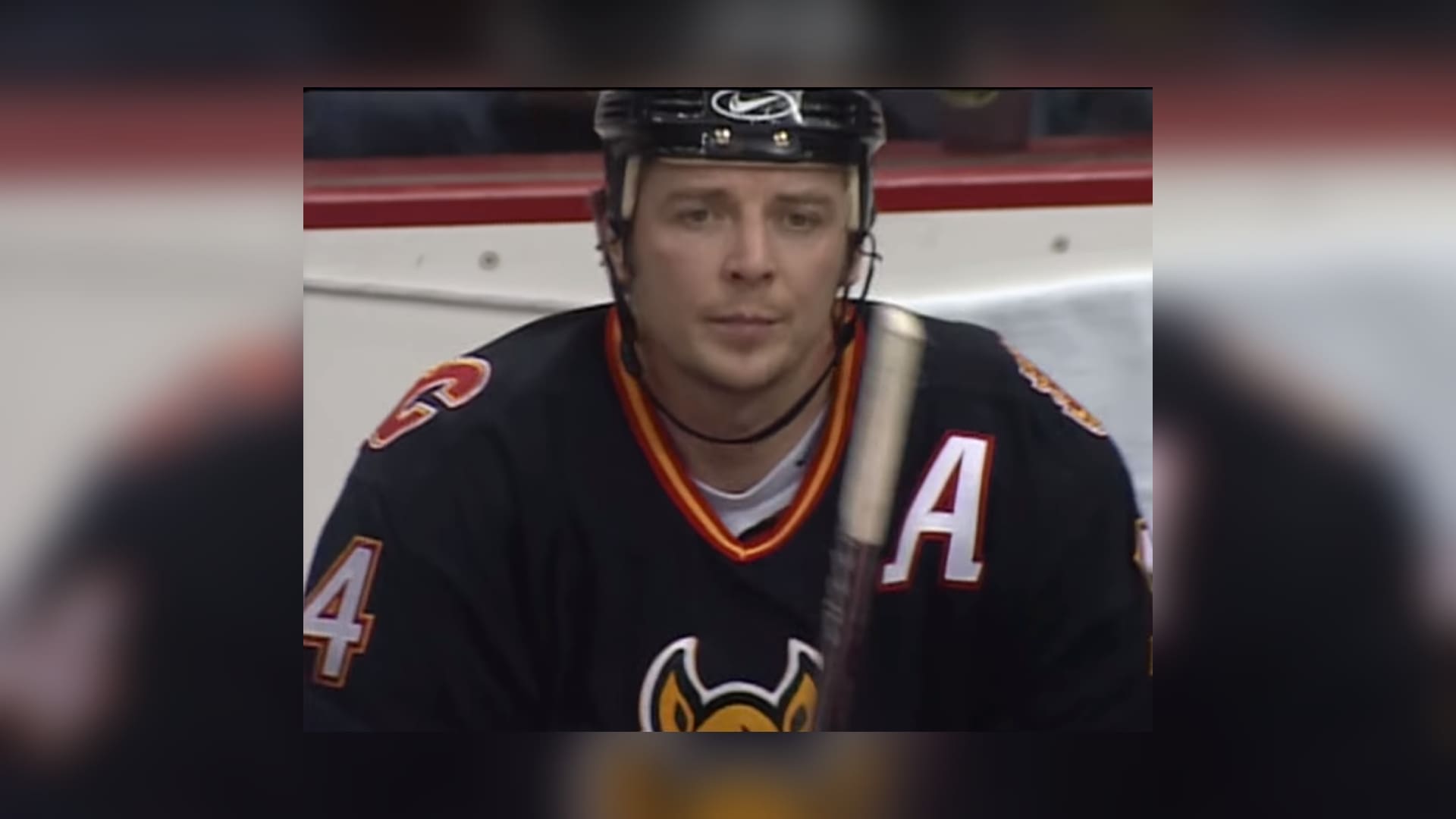
Whenever I comb lists of any year’s NHL entry draft, I often start at the end. Most of the players chosen late don’t go on to play in the league, but when they do, it’s something to note.
Like the previous story I wrote on players the Calgary Flames have taken over history in Rounds 10-12, teams think enough of prospects to take a flier on them in later rounds in case they beat the odds and rise above everyone else who stands ahead of them in the pecking order.
1. Theoren Fleury
1987: Round 8, 166th overall
Among the players the Calgary/Atlanta franchise has selected in rounds seven through nine, Theoren Fleury stands above all. After Jarome Iginla, I’d argue, he’s the most legendary player to have donned the Flaming C.
I’d argue that partly because he was taken late in the 1987 draft.
Fleury was undersized, standing 5-foot-5 and weighing 152 lb. when he reported to his first Calgary training camp that September.
“I came in with a mission,” Fleury told the Calgary Herald then. “I was a late draft pick. I anted to show I was better than some of the players picked ahead of me.”
The Manitoban born in Saskatchewan showed them, all right. Fleury was all heart, sweat, hard work and a goal-scoring threat on the ice, resulting in a sterling 11-season run with the Flames.
He won the Stanley Cup in his rookie pro season, which started in the AHL with Salt Lake (where he scored 37 goals and 74 points in 40 games) and saw him record 34 points in 36 games after being promoted to the Flames roster on Jan. 1, 1989.
Fleury averaged slightly more than a point per game in Calgary — 830 of them over 791 games played — scoring 100 points in a season twice and 50-plus goals once, averaging about 35 goals per season.
Fleury was team captain when the Flames dealt him to the Colorado Avalanche at the 1999 trade deadline. He wound up playing 1,084 games over 15 seasons in the NHL, scoring 455 goals and 1,088 points.
Fleury battled alcoholism over his career and entered the league’s substance abuse program twice near the end of his NHL days while playing for the New York Rangers and the Chicago Blackhawks. He was suspended indefinitely in 2003 while with Chicago.
Fleury played for Belfast in the British Elite League two years later then tried his hand at winning an Allan Cup senior Canadian men’s title twice with the Horse Lake Thunder. At age 41 in 2009, he attempted a comeback with the Flames but failed to make the team out of training camp. He officially retired shortly after.
The seven-time NHL all-star also won an Olympic gold medal with Team Canada in 2002.
| Season | Age | Tm | GP | G | A | PTS | +/- | PIM | SOG | S% |
| 1988-89 | 20 | Cgy | 36 | 14 | 20 | 34 | 5 | 46 | 89 | 15.7 |
| 1989-90 | 21 | Cgy | 80 | 31 | 35 | 66 | 22 | 157 | 200 | 15.5 |
| 1990-91 | 22 | Cgy | 79 | 51 | 53 | 104 | 48 | 136 | 249 | 20.5 |
| 1991-92 | 23 | Cgy | 80 | 33 | 40 | 73 | 0 | 133 | 225 | 14.7 |
| 1992-93 | 24 | Cgy | 83 | 34 | 66 | 100 | 14 | 88 | 250 | 13.6 |
| 1993-94 | 25 | Cgy | 83 | 40 | 45 | 85 | 30 | 186 | 278 | 14.4 |
| 1994-95 | 26 | Cgy | 47 | 29 | 29 | 58 | 6 | 112 | 173 | 16.8 |
| 1995-96 | 27 | Cgy | 80 | 46 | 50 | 96 | 17 | 112 | 353 | 13 |
| 1996-97 | 28 | Cgy | 81 | 29 | 38 | 67 | -12 | 104 | 336 | 8.6 |
| 1997-98 | 29 | Cgy | 82 | 27 | 51 | 78 | 0 | 197 | 282 | 9.6 |
| 1998-99 | 30 | TOT | 75 | 40 | 53 | 93 | 26 | 86 | 301 | 13.3 |
| 1998-99 | 30 | Cgy | 60 | 30 | 39 | 69 | 18 | 68 | 250 | 12 |
| 1998-99 | 30 | Col | 15 | 10 | 14 | 24 | 8 | 18 | 51 | 19.6 |
| 1999-00 | 31 | NYR | 80 | 15 | 49 | 64 | -4 | 68 | 246 | 6.1 |
| 2000-01 | 32 | NYR | 62 | 30 | 44 | 74 | 0 | 122 | 238 | 12.6 |
| 2001-02 | 33 | NYR | 82 | 24 | 39 | 63 | 0 | 216 | 267 | 9 |
| 2002-03 | 34 | Chi | 54 | 12 | 21 | 33 | -7 | 77 | 124 | 9.7 |
| Career | 1084 | 455 | 633 | 1088 | 145 | 1840 | 3611 | 12.6 |
2. Gary Suter
1984: Round 9, 180th overall
Suter was a Flames blueline mainstay starting his rookie season in 1985-86, when he scored 18 goals and 68 points, and won the Calder Trophy as the NHL’s top freshman.
He and Al MacInnis formed a fearsome top pairing for many of the nine seasons Suter played in Calgary. Suter scored 564 points in 617 games played for the Flames. The Madison, Wis., native set career highs in assists (70) and points (91) in 1987-88 and was a key member of the club when they won the Stanley Cup a year later.
On March 10, 1994, the Flames traded him, Ted Drury and Paul Ranheim to the Hartford Whalers for Michael Nylander, James Patrick and Zarley Zalapski. Hartford flipped him to the Chicago Blackhawks the next day. After four seasons in the Windy City, he was dealt to the San Jose Sharks, with whom he played the rest of his NHL career, finishing it in 2002 with 844 points (203 goals and 641 assists) in 1,145 games played.
| Season | Age | Tm | GP | G | A | PTS | +/- | PIM | SOG | S% |
| 1985-86 | 21 | CGY | 80 | 18 | 50 | 68 | 11 | 141 | 195 | 9.2 |
| 1986-87 | 22 | CGY | 68 | 9 | 39 | 48 | -10 | 70 | 152 | 5.9 |
| 1987-88 | 23 | CGY | 75 | 21 | 70 | 91 | 39 | 124 | 204 | 10.3 |
| 1988-89 | 24 | CGY | 63 | 13 | 49 | 62 | 26 | 78 | 216 | 6 |
| 1989-90 | 25 | CGY | 76 | 16 | 60 | 76 | 4 | 97 | 211 | 7.6 |
| 1990-91 | 26 | CGY | 79 | 12 | 58 | 70 | 26 | 102 | 258 | 4.7 |
| 1991-92 | 27 | CGY | 70 | 12 | 43 | 55 | 1 | 128 | 189 | 6.3 |
| 1992-93 | 28 | CGY | 81 | 23 | 58 | 81 | -1 | 112 | 263 | 8.7 |
| 1993-94 | 29 | TOT | 41 | 6 | 12 | 18 | -12 | 38 | 86 | 7 |
| 1993-94 | 29 | CGY | 25 | 4 | 9 | 13 | -3 | 20 | 51 | 7.8 |
| 1993-94 | 29 | CHI | 16 | 2 | 3 | 5 | -9 | 18 | 35 | 5.7 |
| 1994-95 | 30 | CHI | 48 | 10 | 27 | 37 | 14 | 42 | 144 | 6.9 |
| 1995-96 | 31 | CHI | 82 | 20 | 47 | 67 | 3 | 80 | 242 | 8.3 |
| 1996-97 | 32 | CHI | 82 | 7 | 21 | 28 | -4 | 70 | 225 | 3.1 |
| 1997-98 | 33 | CHI | 73 | 14 | 28 | 42 | 1 | 74 | 199 | 7 |
| 1998-99 | 34 | SJS | 1 | 0 | 0 | 0 | 0 | 0 | 1 | 0 |
| 1999-00 | 35 | SJS | 76 | 6 | 28 | 34 | 7 | 52 | 175 | 3.4 |
| 2000-01 | 36 | SJS | 68 | 10 | 24 | 34 | 8 | 84 | 157 | 6.4 |
| 2001-02 | 37 | SJS | 82 | 6 | 27 | 33 | 13 | 57 | 174 | 3.4 |
| Career | 1145 | 203 | 641 | 844 | 126 | 1349 | 3091 | 6.6 |
3. Hakan Loob
1980: Round 9, 181st overall
Before there was THAT No. 12, he was THE No. 12.
Hakan Loob was the player best known for wearing those digits as a Flame until a certain Iginla showed up and claimed them in the late 1990s.
The top-line winger is one of the greatest Swedish players in hockey history, having forged a star career both internationally and as a pro in his home country primarily playing for Färjestad.
The Flames took a flier on the then 20-year-old Loob in the 1980 draft. GM Cliff Fletcher was unable to convince Loob to cross the Atlantic and join Calgary until 1983-84, the season after he set Swedish elite league records for goals and points that still stand today.
He scored 30-plus goals his first three seasons as a Flame, hit the 50-goal mark in 1987-88 and won the Stanley Cup with Calgary in 1989.
While celebrating the Cup victory, he revealed he was forgoing his final year of his contract to return home to Sweden the next year. He played seven more pro seasons with Färjestad, retiring as a player in 1996 to become the team’s general manager.
| Season | Age | Tm | GP | G | A | PTS | +/- | PIM | SOG | S% |
| 1983-84 | 23 | Cgy | 77 | 30 | 25 | 55 | 9 | 22 | 178 | 16.9 |
| 1984-85 | 24 | Cgy | 78 | 37 | 35 | 72 | 14 | 14 | 224 | 16.5 |
| 1985-86 | 25 | Cgy | 68 | 31 | 36 | 67 | 24 | 36 | 174 | 17.8 |
| 1986-87 | 26 | Cgy | 68 | 18 | 26 | 44 | -13 | 26 | 129 | 14 |
| 1987-88 | 27 | Cgy | 80 | 50 | 56 | 106 | 41 | 47 | 198 | 25.3 |
| 1988-89 | 28 | Cgy | 79 | 27 | 58 | 85 | 28 | 44 | 223 | 12.1 |
| Career | 450 | 193 | 236 | 429 | 103 | 189 | 1126 | 17.1 |
4. David Moss
2001: Round 7, 220th overall
Moss was on his way to the University of Michigan when the Flames took him in the 2001 draft. The Livonia, Mich., native played four years of NCAA hockey with the Wolverines before turning pro with the Flames organization in 2005. He spent a season and a half with the Flames’ AHL affiliate in Omaha before being promoted to the NHL in December 2006. He scored goals in his first three NHL games, becoming the first Flame to pull the feat.
Injuries, however, plagued much of Moss’s NHL career. In 2007-08, various ailments kept him out of the lineup, and he scored just four goals in 41 games. The next season was his most productive in Calgary, when he scored 20 goals and 39 points in 81 games.
Injuries, though, played a factor his remaining three seasons with the team and his output was limited. Moss did, however, flourish in a top-line role in 2010-11, when coach Brent Sutter moved him to centre between Iginla and Alex Tanguay. He was limited to just 58 games that season thanks to a high-ankle sprain, however, but he put up 17 goals and 30 points regardless.
Moss, who is a cousin to Phil, Blake and Amanda Kessel, left the Flames as a free agent in 2012 when he signed with the Phoenix Coyotes.
| Season | Age | Tm | GP | G | A | PTS | +/- | PIM | SOG | S% |
| 2006-07 | 25 | Cgy | 41 | 10 | 8 | 18 | 5 | 12 | 70 | 14.3 |
| 2007-08 | 26 | Cgy | 41 | 4 | 7 | 11 | -4 | 10 | 60 | 6.7 |
| 2008-09 | 27 | Cgy | 81 | 20 | 19 | 39 | -5 | 22 | 194 | 10.3 |
| 2009-10 | 28 | Cgy | 64 | 8 | 9 | 17 | -9 | 20 | 133 | 6 |
| 2010-11 | 29 | Cgy | 58 | 17 | 13 | 30 | 9 | 18 | 127 | 13.4 |
| 2011-12 | 30 | Cgy | 32 | 2 | 7 | 9 | -3 | 12 | 82 | 2.4 |
| 2012-13 | 31 | Phx | 45 | 5 | 15 | 20 | 3 | 21 | 82 | 6.1 |
| 2013-14 | 32 | Phx | 79 | 8 | 14 | 22 | -1 | 18 | 151 | 5.3 |
| 2014-15 | 33 | Ari | 60 | 4 | 8 | 12 | -18 | 24 | 96 | 4.2 |
| Career | 501 | 78 | 100 | 178 | -23 | 157 | 995 | 7.8 |
5. Jiri Hrdina
1984: Round 8, 159th overall
The Flames took a flier on Hrdina, who by the time they drafted the forward from then Czechoslovakia had starred on the international stage in world championships and the Olympics.
In January 1987, with relations between European communist countries and the West warming up, and with the Czech hockey federation allowing players age 30 and over to ply their trade in North America, the national team captain indicated he intended to join the Flames following the 1988 Games in Calgary. He did just that.
He finished the ’87-88 campaign with the Flames then played two full seasons donning red and yellow in a checking role, winning the Stanley Cup in 1989. He was dealt to the Pittsburgh Penguins in December 1990, a move Hrdina wasn’t thrilled with initially. In Pittsburgh, he joined another contending team, which included 18-year-old rookie and fellow countryman Jaromir Jagr, in time to win two more Cups. Hrdina retired following the second championship by the Penguins in 1992.
| Season | Age | Tm | GP | G | A | PTS | +/- | PIM | SOG | S% |
| 1987-88 | 30 | Cgy | 9 | 2 | 5 | 7 | 7 | 2 | 13 | 15.4 |
| 1988-89 | 31 | Cgy | 70 | 22 | 32 | 54 | 19 | 26 | 147 | 15 |
| 1989-90 | 32 | Cgy | 64 | 12 | 18 | 30 | 10 | 31 | 96 | 12.5 |
| 1990-91 | 33 | TOT | 51 | 6 | 17 | 23 | -6 | 17 | 66 | 9.1 |
| 1990-91 | 33 | Cgy | 14 | 0 | 3 | 3 | -4 | 4 | 8 | 0 |
| 1990-91 | 33 | Pit | 37 | 6 | 14 | 20 | -2 | 13 | 58 | 10.3 |
| 1991-92 | 34 | Pit | 56 | 3 | 13 | 16 | 4 | 16 | 51 | 5.9 |
| Career | 250 | 45 | 85 | 130 | 34 | 92 | 373 | 12.1 |

